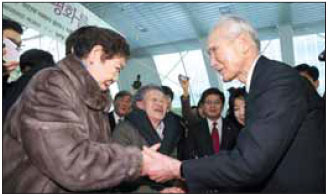Tokyo has announced plans to ease its decades-long self-imposed arms embargo and partly remove constitutional restrictions on the involvement of Japanese armed forces in support of allies.
Under proposed reforms, Japan would allow exports of defense equipment to international organizations such as those involved in UN peacekeeping operations on condition that they do not take sides in conflicts, Kyodo News reported on Tuesday.
|
 |
|
Former Japanese prime minister Tomiichi Murayama attends an art show by former "comfort women" in Seoul on Tuesday. Provided to China Daily |
|
Ex-Japanese leader meets former 'comfort women' |
|
Tomiichi Murayama, the former Japanese prime minister known for his 1995 apology over the country's wartime aggression, met on Tuesday with three South Korean "comfort women" who served as sex slaves to Japanese troops. "Please stay healthy," the 89-year-old former premier told the women as he clasped their hands at an exhibition of artworks by comfort women being held in Seoul. Murayama arrived on Tuesday for a three-day visit at the invitation of an opposition party. One of the three women, Kang Ul-chul, said through an interpreter that the Japanese government should apologize properly to the former sex slaves and provide compensation. They also presented him with one of the artworks, titled Flower Destroyed Unbloomed. Murayama served as Japan's prime minister from 1994 to 1996 and is best remembered for his 1995 speech in which he publicly apologized for Japanese atrocities during World War II. AFP |
Wu Huaizhong, an expert on Japanese politics and defense at the Chinese Academy of Social Sciences, said the Japanese Self-Defense Forces are seeking a more assertive role in international affairs, including more opportunities for external operations.
The move is in line with the top priorities of hawkish Japanese Prime Minister Shinzo Abe, Wu said.
Tokyo sparked controversy in late December when it provided bullets to South Korean UN peacekeeping troops in South Sudan via the UN.
South Korean media blasted the move - which Tokyo defended as an "exception" to the ban - as violating the embargo, and the bullets were soon returned.
In 1967, Japan drew up three principles on arms exports, banning sales to countries with communist governments, those involved in international conflicts, and those subject to UN sanctions.
Wu said the new policy of "proactive pacifism" - a slogan of Abe for defining Japan's security strategies - is just a cover for military expansion.
On Monday, Abe told a committee meeting of the Japanese lower house about his plan of partly activating the right of collective self-defense, Japan's Fuji Television reported.
Japanese public opinion is split over whether to allow the exercise of collective self-defense, according to a poll by Japanese public broadcaster NHK on Tuesday.
Of the 1,000 interviewees, 29 percent said Japan "should", 22 percent said "should not" and 40 percent said "it is hard to say whether it should or should not".
Meanwhile, a top US general criticized Abe's recent remarks about China.
Bloomberg News on Monday quoted the commander of US air forces in the Pacific as saying that recent statements of Japanese and Philippines leaders - drawing parallels between China's rise in the region and events in Europe before both world wars - were "not helpful".
"The rise of Germany and what occurred between the UK in particular and Germany, and what happened in Europe, I don't draw that comparison at all to what's going on today", General Herbert Carlisle said.
In January, Abe compared current China-Japan relations to the ties of Britain and Germany before World War I, saying that their strong trade ties did not prevent conflict.
"Some of the things, in particular that have been done by Japan, they need to think hard about what is provocative to other nations," Carlisle said.
Contact the writer at zhangyunbi@chinadaily.com.cn
|
|
|
|
|
|
|
|
